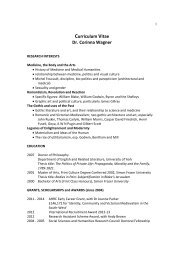'Cast out into the hellish night': Pagan Virtue and ... - Humanities
'Cast out into the hellish night': Pagan Virtue and ... - Humanities
'Cast out into the hellish night': Pagan Virtue and ... - Humanities
Create successful ePaper yourself
Turn your PDF publications into a flip-book with our unique Google optimized e-Paper software.
Philippa Byrne Ex Historia 56<br />
I ask what <strong>the</strong> poets wished to obtain with so much toil by day <strong>and</strong> night? Certainly <strong>the</strong>y<br />
wished to become famous, not virtuous but famous – <strong>and</strong> all of <strong>the</strong>m acknowledged that<br />
<strong>the</strong>y strove for this. 37<br />
This argument <strong>the</strong>n develops <strong>into</strong> a broader consideration of <strong>the</strong> desires which compel men to<br />
study:<br />
Quite often I am so tired of studies, so exhausted, so vexed, that I am nearly ill in soul<br />
<strong>and</strong> body [...]. Who, may I ask, would apply himself to literary studies, induced by <strong>the</strong><br />
delights of contemplation alone? 38<br />
The Epicurean Vegio asserts that whilst contemplation is often tiresome, men endure it for <strong>the</strong><br />
anticipated recompense of praise <strong>and</strong> fame. 39 Significantly, however, <strong>the</strong> Epicurean interlocutor<br />
never goes as far as to suggest that fame is a reward for virtue, as some of Valla’s contemporaries<br />
might have done: ra<strong>the</strong>r he believes that fame is more ‘real’ <strong>and</strong> valuable than virtue, because<br />
fame alone can provide pleasure.<br />
By contrast, Valla’s Christian orator, Antonio da Rho, does not deny <strong>the</strong> reality of virtue, but<br />
rejects <strong>the</strong> supposed correlation between righteous behaviour <strong>and</strong> earthly reward for such<br />
behaviour. Boethius, <strong>the</strong> sixth-century author of The Consolation of Philosophy, is attacked for his<br />
simplistic contention that <strong>the</strong> evil are always miserable <strong>and</strong> <strong>the</strong> virtuous always happy. 40 This is<br />
not <strong>the</strong> case, as <strong>the</strong> biblical story of Job demonstrates – <strong>the</strong> good often live in misery. Antonio da<br />
Rho asserts that merits do not always find earthly reward: ‘it is indeed possible to see many most<br />
37 De voluptate, II.xi [4] p. 163.<br />
38 Ibid., II.xxviii [14-5] pp. 203-5.<br />
39 Ibid., I.xxxiii [1] p. 115.<br />
40 Ibid., III.xiii [1-3] pp. 269-71; Boethius, The Consolation of Philosophy, trans. by V. Watts (Harmondsworth:<br />
Penguin, 1969), IV.iv, pp. 96-101.









